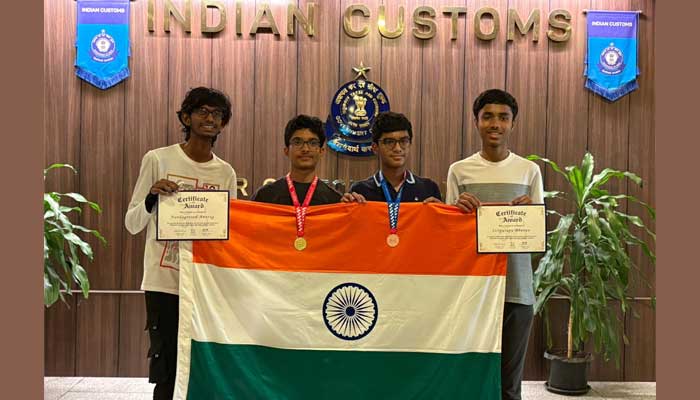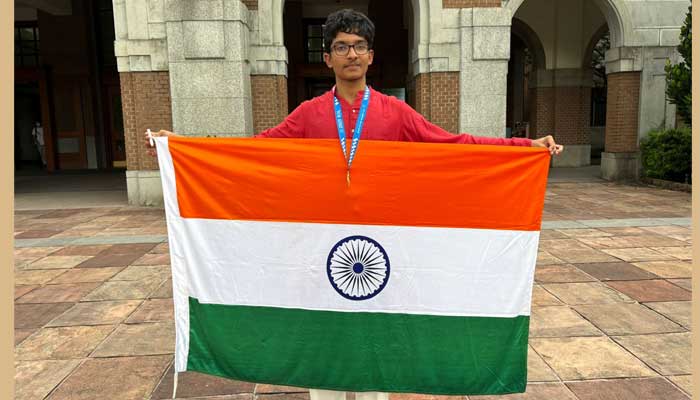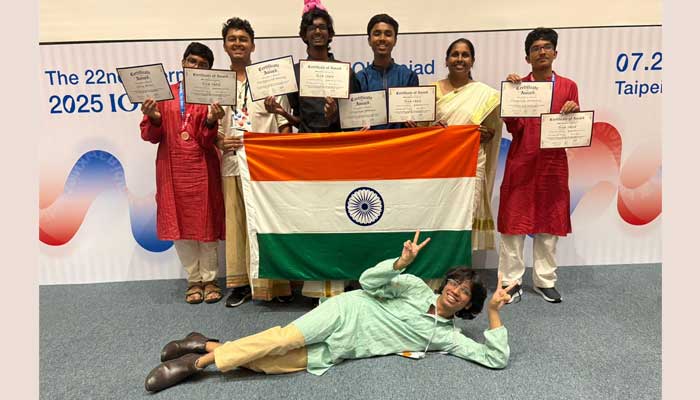The team comprised of Vaageesan Surendran who won the Gold medal, Advay Misra who bagged the Bronze and Nandagovind Anurag and Siripurapu Bhuvan, who were both awarded Honourable Mentions.
A love for decoding rare languages and decrypting clues has led a team of 4 young boys from India to win one gold, one bronze medal, two individual honorable mentions as well as an honorable mention for the entire team at the 22nd International Linguistics Olympiad (IOL) that concluded on July 30th in Taipei, Taiwan. The team was led by Prof. Parameswari Krishnamurthy from IIIT Hyderabad. They were accompanied by an observer, Anshul Krishnadas Bhagwat, undergraduate researcher at IIITH and a past IOL participant himself. The youngsters in the team included 15 year-old Vaageesan Surendran (from Chennai), 12-year-old Advay Misra (from New Delhi), 18 year-old Nandagovind Anurag (from Bengaluru), and 15 year-old Siripurapu Bhuvan (from Hyderabad).

The International Linguistics Olympiad is one of the 13 International Science Olympiads and brings together secondary school students and experts from various fields of linguistics. As per the website, the competition challenges participants to analyze the grammar, structure, culture, and history of different languages and to demonstrate their linguistic abilities through puzzles and problem-solving challenges. Contrary to general perception, no prior knowledge of linguistics or languages is required, as even the most challenging problems only require logical ability, patient work, and a willingness to think outside the box.
Clocking Many Firsts
This year, a total of 227 contestants from 57 teams representing 42 countries and territories competed in IOL 2025. The performance at Taipei has marked many firsts for Team India. It is the first time since India’s debut at the IOL in 2009 that each member of the team has won an award. “All of them got some kind of recognition. It is also after a gap of a few years that we are winning a gold. The last time was in 2021 when the contest was held online,’ mentions Prof. Krishnamurthy, adding that it is also the first time that the team as a whole has won an honorable mention too.
Exam Format
The contest is conducted in two formats; as an individual competition where each contestant is given a problem set comprising of 5 separate problems that have to be solved over a period of 6 hours. Each answer needs to be supported by a detailed explanation, which in turn requires a systematic summary of the facts discovered by the contestants. The other category is the team competition where contestants collaborate together to solve a single problem that lasts over 4 hours. Teamwork clearly gives a different high. For someone like Nandagovind whose prep work for the competition involved solving past year problems and the problem sets given by his mentors, he says, ”I found the group solving with my teammates and friends quite helpful.”

PLO: The Launchpad
The road to IOL begins with the Panini Linguistics Olympiad (PLO) in India which serves as the national selection round for its international counterpart. The PLO which is open to all middle-school and high school students (up to grade 12) has 2 selection rounds. The first round is conducted across multiple cities of the country and top participants of round 1 are eligible to participate in the Asia Pacific Linguistics Olympiad (APLO). Top participants of round 1 are also invited to attend a Linguistics camp in Hyderabad hosted by IIITH where they get to learn key tips and tricks. “For the last few years, IIITH has been playing a major role in mentoring the team that represents India at IOL,” says Prof. Krishnamurthy who is also the Organising Chair of the PLO Board that is responsible for conducting the 10-day long camp at IIITH. The Board is chaired by Prof. Monojit Chowdhury, ex-Microsoft Research, currently at Mohammed bin Zayed University of Artificial Intelligence and co-chaired by Prof. Manish Shrivastava, IIITH. The team of 4 that participated in IOL was selected at the culmination of the camp. “There was also a pre-departure training camp held for the final four in IIITH. I have been with them throughout, to guide them and have witnessed their progress. They put in a lot of effort to get here and it’s really so nice to see young people passionate about Linguistics,” remarks Anshul.
We Are The Champions
Vaageesan Surendran who bagged the gold medal is a 11th grader who is currently preparing for the JEE. His path to the IOL was paved with a passion for languages. Fluent in English, Mandarin, Spanish and Hindi, along with his mother tongue, Tamil, his linguistic prowess is accented by his ability to read the scripts of 34 different languages. Vaageesan who has also won the International Geography Bee Asian Championship in 2021 and 2023 found the IOL’s challenge fascinating. He says that while some of the problems in the contest were easy and some were hard, all of them were interesting and captivated him. One of the goals of the competition is to promote awareness and understanding about the diverse cultures and histories of different languages which was met by the diversity of the countries that participated. “We all got to meet new people from around the world and made new friends,” affirms Vaageesan.

Twelve-year-old Advay was perhaps the youngest participant at the IOL. Hitting the headlines is not novel for this pre-teen who holds the unique distinction of being the Asian Science Bee champion three years in a row. He has also won the Academic Bee championship twice consecutively in 2023 and 2024. Even as an 8-year-old, the child prodigy was named one of the brightest kids in the world by John’s Hopkins University, US and is a member of their Center for Talented Youth. Speaking about the competition, Advay says, “While solving the problems, an ‘aha’ moment for me, was realising that, if a particular component of a problem is equal to 0, then everything works out quite neatly. This has occurred in a surprising number of puzzles.” For him, one of the most exciting moments during their time at Taiwan was releasing sky lanterns in Shifen with messages. “We wrote those messages in our native languages presenting breath-taking linguistic diversity,” he remarks.

Like a vast majority of the general public, Bhuvan says that while growing up he assumed Linguistics was all about learning lots of languages and hence was never attracted to it. “This was all until I found out about the IOL. It opened my eyes to the wonders of language and how Linguistics transcends simply memorising languages. It showed me the intricacies and nuances present in language. Even then, the IOL is so much more than just a contest; it’s an opportunity to meet incredible individuals and make lifelong friendships,” he states. Incoming freshman at St. John’s College, University of Oxford, Nandagovind couldn’t agree more. “While the IOL was an opportunity for me to represent India, it was also an opportunity to experience the world,” he declares, adding, “The interactions I had with the other teams were what really made IOL special to me.”

Outreach and Preparation
Unlike the other Science Olympiads, the Linguistics Olympiad remains more niche with most contestants hailing from bigger cities or metros. “For a country of our size, we would love to encourage more students and see bigger numbers participating in round 1 of the PLO. Currently it is woefully inadequate,” admits Prof. Krishnamurthy. This is in contrast to the wider reach of the competition in countries like UK and Bulgaria who consistently bag medals at the IOL. “We have been making efforts to reach out to schools not only in the urban and tier-1 cities but also in tier-2 and rural areas,” she says. For those interested in participating, Bhuvan recommends solving tons of previous problems and asking around for help. He adds,” But more than anything, just enjoy the ride and treasure the memories you make. The joy Linguistics has brought me is truly like no other”. The four winners definitely agree on the ‘having fun’ part of the advice they’d like to share with future participants. “You learn just so much during late nights with new friends from all around the world as you do during the contests, So cherish every moment of your journey irrespective of the outcome,” recommends Nandagovind. “The IOL is a close-knit, welcoming community that readily accepts newcomers into its fold,” observes Advay.
Team India’s presence at IOL is sponsored by Athlyte, Inc, a DE USA incorporated sports analytics company (www.athlytesports.com), serving U.S. college and university sports communicators.
For those who would like to give Linguistics a shot, keep an eye on the Olympiad timelines here.

Sarita Chebbi is a compulsive early riser. Devourer of all news. Kettlebell enthusiast. Nit-picker of the written word especially when it’s not her own.


Next post